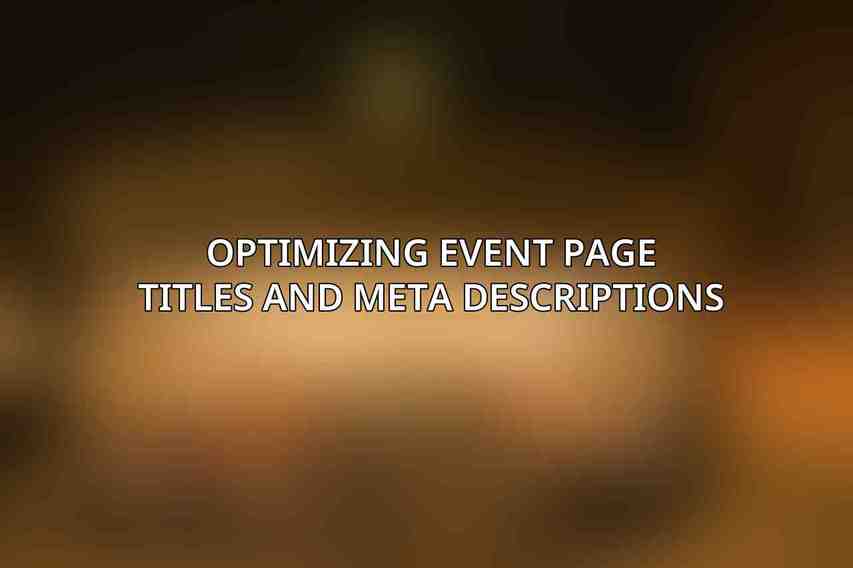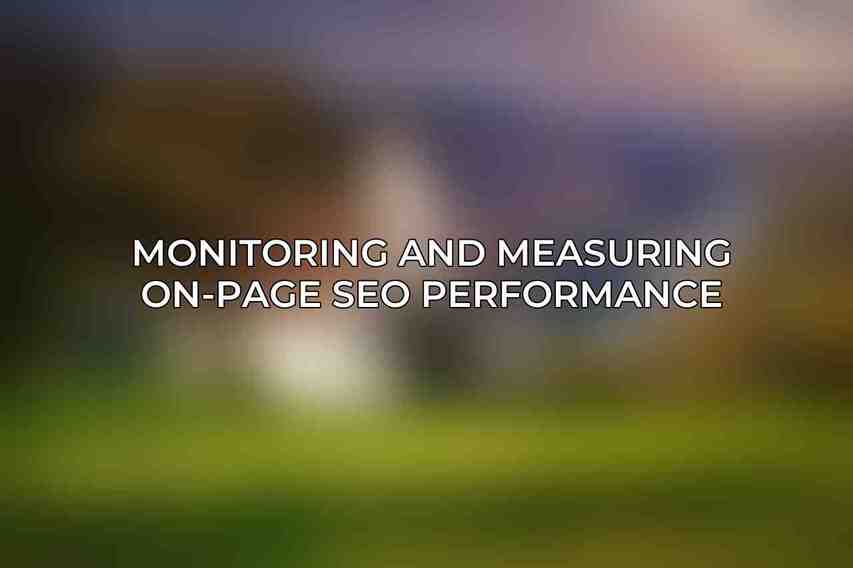Having a robust on-page seo strategy is paramount to ensure the success and visibility of your events. by optimizing various elements on your event website, you can significantly enhance your search engine rankings, attract more attendees, and ultimately boost the overall success of your events. Let’s delve into the intricacies of on-page SEO for event promotion and explore the key strategies and techniques to maximize your online presence. You can find more information on How to Conduct Keyword Research for Event SEO
Importance of SEO for Event Promotion
Implementing effective SEO strategies for event websites is crucial as it directly impacts the visibility and discoverability of your events online. By optimizing your on-page elements, you can improve your website’s ranking on search engine results pages (SERPs) and attract a larger audience to your events.
Key On-Page SEO Elements for Event Pages
Some of the essential on-page SEO elements for event pages include meta titles, meta descriptions, header tags (H1, H2, H3), high-quality content, image optimization, page speed, mobile responsiveness, internal linking, schema markup, and monitoring and measuring performance metrics.
Optimizing Event Page Titles and Meta Descriptions

Crafting compelling and informative page titles is crucial for capturing the attention of potential attendees and improving click-through rates. Similarly, writing engaging meta descriptions that accurately describe your event can entice users to click on your website in search results. Targeting specific keywords in both the title and meta description can enhance your search visibility among the target audience. Read more on How to Measure SEO Success for Your Event
Using Header Tags for Structured Content
Importance of H1, H2, and H3 Tags
Header tags play a vital role in organizing and structuring your content for both users and search engines. H1 tags should encompass the main heading of your page, while H2 and H3 tags can be used to break down content into subheadings and further subtopics. Properly optimizing header tags with relevant keywords can improve the overall SEO of your event pages.
Optimizing Header Tags for Relevance and Keyword Inclusion
When optimizing header tags, ensure that they are directly related to the content on the page and contain important keywords that reflect the event or its key aspects. This not only helps search engines understand the context of your content but also improves the user experience by providing a clear content hierarchy.
Optimizing Event Page Content
Creating High-Quality, Informative Event Descriptions
Compelling and informative event descriptions not only attract potential attendees but also provide valuable content for search engines to index. Describe your event in detail, highlighting its unique selling points and key information that attendees would find useful.
Incorporating Relevant Keywords Throughout the Content
Integrating relevant keywords naturally throughout your event page content can improve its visibility in search results. Be mindful not to overuse keywords (keyword stuffing) but rather focus on creating valuable and engaging content that resonates with your target audience.
Using Keyword Variations to Target Related Search Terms
In addition to primary keywords, incorporating variations and related terms can broaden your reach on search engines. By diversifying your keyword strategy, you can attract a wider range of potential attendees who may use different search queries to find events similar to yours.
Optimizing Image Alt Tags for Accessibility and Keyword Optimization
Don’t neglect the optimization of image alt tags on your event pages. Alt tags not only improve accessibility for visually impaired users but also provide another opportunity to include relevant keywords associated with your event images.
Enhancing Page Speed and Mobile Responsiveness
Significance of Page Load Speed for User Experience and Search Rankings
Page speed is a critical factor that influences both user experience and search engine rankings. A faster-loading website not only enhances user satisfaction but also signals to search engines that your site provides a seamless browsing experience.
Best Practices for Optimizing Image File Sizes and Reducing HTTP Requests
Optimize your event website’s images by compressing their file sizes without compromising quality. Additionally, minimize the number of HTTP requests by combining CSS and JavaScript files, leveraging browser caching, and utilizing content delivery networks (CDNs) for faster loading times.
Ensuring Mobile Responsiveness for Seamless Access from Various Devices
With the increasing use of mobile devices for browsing, it’s essential to ensure that your event website is fully responsive across different screen sizes. A mobile-friendly design not only improves user experience but also boosts your chances of ranking higher in mobile search results.
Internal Linking for Improved Navigation
Importance of Internal Linking for Website Hierarchy
Internal linking plays a significant role in establishing a logical website hierarchy and guiding users to relevant content within your site. By strategically linking to other event pages or blog posts, you can improve navigation and keep users engaged on your site for longer periods.
Linking to Relevant Event Pages and Blog Posts
When implementing internal links, prioritize linking to other relevant event pages or blog posts that provide additional value to your audience. This not only enriches the user experience but also helps search engines understand the interconnectedness of your content.
Using Anchor Text Optimization for Improved Keyword Targeting
Optimize anchor text by using descriptive and keyword-rich phrases that accurately reflect the content of the linked page. Anchor text optimization not only improves usability but also reinforces the relevance of your content to search engines.
Schema Markup for Rich Snippets
Introduction to Schema Markup and Its Benefits
Schema markup is a structured data format that allows search engines to better understand the content on your website. By implementing schema for events, you can enhance your search listings with rich snippets that display event details such as date, time, venue, and ticket information.
Using Event Schema to Display Event Details in Search Results
Event schema markup provides search engines with specific information about your events, enabling them to display enhanced search results with rich snippets. By including event schema on your event pages, you can make your listings more informative and visually appealing to users.
Implementing Schema Markup to Enhance Visibility and Click-Through Rates
The use of schema markup not only improves the visibility of your event listings in search results but also increases the likelihood of users clicking on your website. Rich snippets stand out among standard search results, attracting more attention and potentially driving higher click-through rates.
Monitoring and Measuring On-Page SEO Performance

Tracking Key Metrics Such as Rankings, Organic Traffic, and Conversions
Monitoring key performance metrics is essential to evaluate the effectiveness of your on-page SEO efforts. Keep track of important metrics such as keyword rankings, organic traffic, conversion rates, bounce rates, and user engagement to measure the impact of your SEO strategies.
Using Google Analytics and Search Console to Analyze Results
Utilize tools like Google Analytics and Google Search Console to gain valuable insights into your website’s performance. Analyze user behavior, traffic sources, keyword performance, and other relevant data to identify strengths and weaknesses in your on-page SEO strategy.
Conducting Regular Audits to Identify Areas for Improvement
Regularly audit your event website to identify any issues or areas for improvement. Address technical SEO issues, update content based on keyword performance, and make necessary adjustments to enhance the overall on-page SEO health of your website.
Advanced On-Page SEO Techniques
Using XML Sitemaps for Better Indexing
Create and submit XML sitemaps to search engines to ensure all your event pages are properly indexed. XML sitemaps provide search engines with a roadmap of your website’s structure, helping them crawl and index your content more efficiently.
Optimizing Event URLs for Brevity and Keyword Targeting
Optimize your event URLs by keeping them concise, descriptive, and keyword-rich. Clean and SEO-friendly URLs not only improve user experience but also convey important information about the content of the page to search engines.
Canonicalization to Avoid Duplicate Content Issues
Implement canonical tags on your event pages to indicate the preferred version of duplicate or similar content. Canonicalization helps search engines consolidate ranking signals for similar pages and avoid potential issues with duplicate content penalties.
Social Media Integration for Increased Visibility
Integrate social media sharing buttons on your event pages to encourage attendees to promote your events across various platforms. Social signals can indirectly impact SEO by increasing brand visibility, driving traffic to your site, and enhancing engagement with your audience.
Ethical Considerations
Importance of Avoiding Keyword Stuffing and Other Black Hat Tactics
Maintaining ethical practices in your on-page SEO strategies is crucial for long-term success. Avoid keyword stuffing, hidden text, cloaking, and other black hat tactics that can harm your website’s reputation and result in penalties from search engines.
Focusing on Creating Valuable Content and a Positive User Experience
Prioritize creating high-quality, valuable content that caters to the needs and interests of your audience. By focusing on user experience and providing relevant information, you can attract organic traffic, improve engagement, and build credibility with both users and search engines.
Adhering to Google’s Webmaster Guidelines to Maintain Website Integrity
Follow Google’s webmaster guidelines to ensure that your on-page SEO practices align with best practices and ethical standards. By adhering to these guidelines, you can maintain the integrity of your website, avoid penalties, and build a sustainable online presence for your events.
mastering the art of on-page SEO is essential for event organizers looking to elevate the visibility and success of their events. By implementing the strategies outlined in this ultimate guide, you can optimize your event website for search engines, attract a larger audience, and ultimately drive more attendees to your events. Embrace the power of on-page SEO and watch your events flourish in the digital world.
Remember, success in event promotion is not just about organizing a great event; it’s also about ensuring that your target audience can easily find and engage with your event online. Prioritize on-page SEO, follow best practices, and continuously refine your strategies to stay ahead in the competitive world of event promotion. Start implementing these on-page SEO techniques today and set your events up for success in the digital realm!
Frequently Asked Questions
What is On-Page SEO?
On-Page SEO refers to the practice of optimizing web pages to improve a website’s search engine rankings and earn organic traffic. It involves optimizing content, HTML source code, and other elements on a webpage.
Why is On-Page SEO important for event promotion?
Optimizing your event page using On-Page SEO techniques can help increase visibility in search engine results, drive more organic traffic to your event website, and ultimately attract more attendees.
What are some key On-Page SEO elements to focus on for event promotion?
Some key On-Page SEO elements to focus on for event promotion include optimizing meta tags, using relevant keywords, creating high-quality and engaging content, improving website speed and mobile-friendliness, and optimizing images and videos.
How can I optimize meta tags for event promotion using On-Page SEO?
Optimize meta tags for event promotion by including relevant keywords, writing compelling meta titles and descriptions that entice users to click, and ensuring meta tags accurately reflect the content on your event page.
What are some common On-Page SEO mistakes to avoid for event promotion?
Common On-Page SEO mistakes to avoid for event promotion include keyword stuffing, using duplicate content, neglecting website speed and mobile optimization, ignoring image alt text, and neglecting internal linking strategies.

